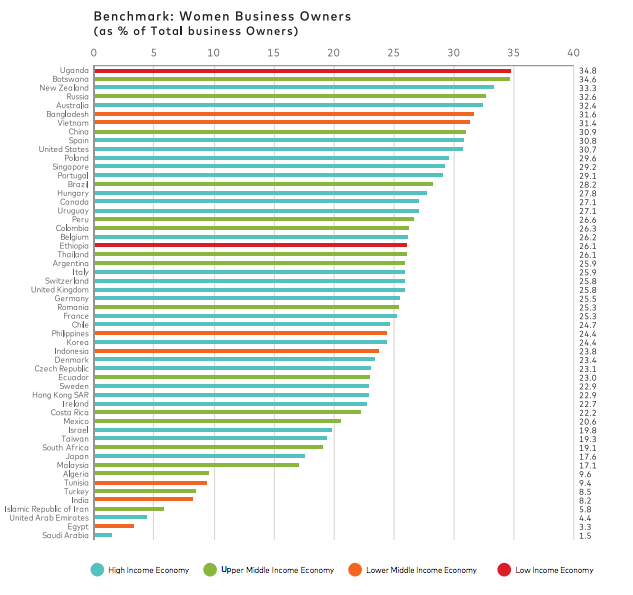According to Mastercard Index of Women’s Entrepreneurship (MIWE) report released recently, it was revealed that 34.8 percent of businesses in Uganda are owned by women, making it the top performing country in the world.
The MIWE is a weighted index that helps to better understand and identify factors and conditions that are most conducive to closing the gender gap among business owners in any given economy.
The three factors include Women’s Advancement Outcomes, Access to Knowledge and Financial Services, and Supporting Entrepreneurial Factors. For the 2016 Index, Mastercard examined 54 different economies around the globe, including Botswana, Ethiopia, South Africa and Uganda.
In Uganda, the extraordinarily high percentage of women business owners (34.8 percent) is reflected through the strong ‘Women Entrepreneurial Activity Rate’ (F/M, 100%, rank 1) , suggesting that women are as likely as men to start a business activity, and have started one for a maximum of three and a half years. They have also been active over the past 12 months seeking to borrow or set aside funds to set up a business

Uganda also excelled in sharing knowledge assets with women and providing financial access, with 90.5 percent borrowing or saving to open a business – higher than the 52.4 percent average of other low to lower middle income countries – and a 95.8 percent gross women tertiary education enrollment rate.
Fact; Nearly one third of Ugandan adults have started a new business within the last two years (compared to less than 25 percent for all other African countries). This growth trend is very strong, gaining 9 percent since 2012, and is mostly necessity-driven for survival.
When compared to other African markets surveyed Botswana leads the charge with the highest rate of women’s advancement outcomes, at 62.6 percent, and was also rated highest (66.6 percent) for providing supportive entrepreneurial conditions.
South Africa earned the top spot for women’s access to financial instruments and knowledge assets in Africa, with 86.7 percent of the populace’s women entrepreneurs having access to knowledge assets and capital.
Related; 2017 Sub-Saharan African Countries Entrepreneurship Ranking
Africa leads in creating resilient women entrepreneurs
The Index results revealed that female entrepreneurs in developing countries are driven by resilience, determination and the desire to provide for their families. The findings reinforce that women entrepreneurs are the backbone of economic growth and powerful engines of development and financial inclusion, especially in Africa.
Women in these emerging markets tend to tap into local business opportunities that do not rely on knowledge or innovation alone – effectively allowing them to avoid financial, regulatory or technical constraints.
“The result of this survey collaborates an economic reality in Africa that women continue to overcome formidable challenges to remain a cornerstone of trade and productivity on the continent,” says Daniel Monehin, Division President for Sub-Saharan Africa and head of Financial Inclusion for International Markets at Mastercard.
According to the Index, some of the main challenges that currently prevent women from venturing into business include lack of financial funding or venture capital, regulatory restrictions and institutional inefficiencies, lack of self-belief and entrepreneurial drive, fear of failure, socio-cultural restrictions, and lack of training and education.
Women entrepreneurs in Africa and other developing markets have proven to be equally vibrant, resourceful and innovative in finding opportunities to improve their own lives as well as create a better future for their children.
An interesting outcome of the Index is that cultural perceptions of women entrepreneurs in Africa are predominantly positive – at 68.8 percent in Uganda, this is well above the average of 41.3 percent.




